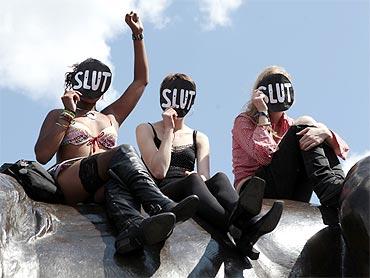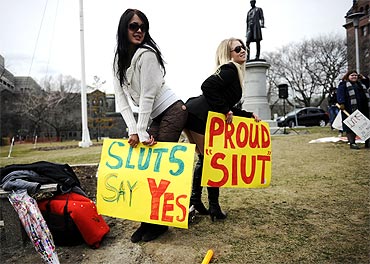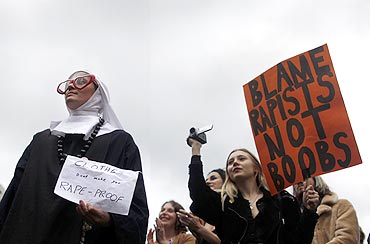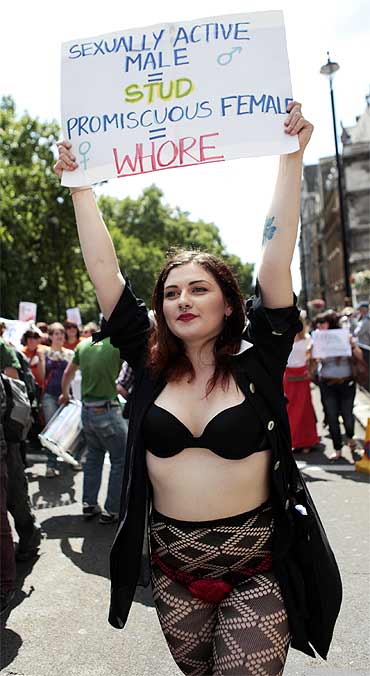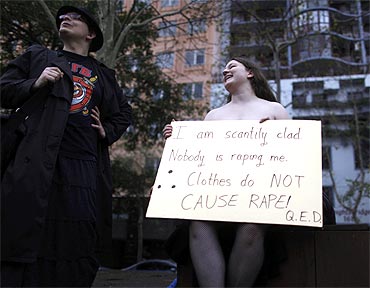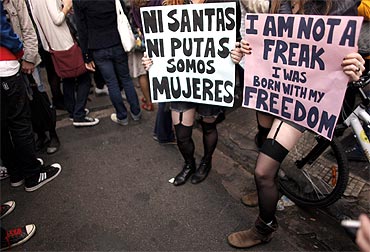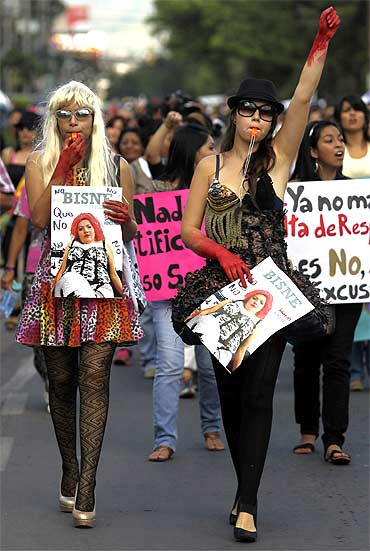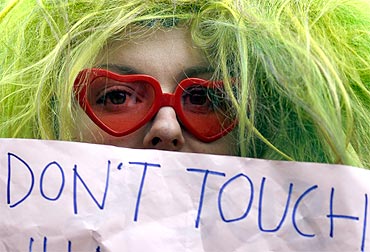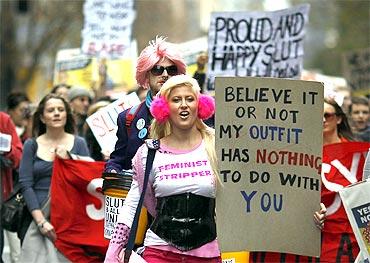This article was first published 14 years ago
Home »
News » On 'SlutWalk' trail: From Toronto to New Delhi
On 'SlutWalk' trail: From Toronto to New Delhi
Last updated on: June 15, 2011 18:18 IST
Image: SlutWalk participants cheer a speaker, after walking from Hyde Park Corner, in Trafalgar Square, central London
Photographs: Olivia Harris/Reuters
In booty shorts and carrying placards reading 'It's a dress, not a yes' and "Our body, our choices" thousands of women will launch 'SlutWalk', a parade to protest against sexual harassment in India's 'rape capital' -- New Delhi.
A Toronto police constable Michael Sanguinetti told an audience of university students in January that women should "avoid dressing like sluts" to evade being sexually assaulted. The remark sparked uproar and women all over Canada took to the streets denouncing the police and giving rise to a movement they call -- SlutWalk. The first such protest of scantily-clad women fighting victim blaming was held in April in Toronto, Canada.
...
Image: People take part in the Slutwalk protest in Toronto
Photographs: Mark Blinch/Reuters
Two months on, the movement has spread across the globe and similar agitations are seen in 20 American states, 60 European cities, Australia and New Zealand.
Holding placards with messages such as 'No victim is to blame' and 'What do you call men who make 'women in the Kitchen jokes? -- single', these protestors have made quite an impact.
And the protest is coming to India as well. Come June 25 and the capital will see a similar stir. Women from all sections of society will take to the streets and India will see its first 'SlutWalk'. In fact, Delhi will be the first Asian city where such an action is planned!
Image: Women pose with placards during the protest in Toronto
Photographs: Mark Blinch/Reuters
Behind Delhi's SlutWalk is 19-year-old Umang Sabarwal, a Delhi University student. She returned to India four years ago after studying in Canada and this stir is her reacting out of frustration at the capital's history of violence against women.
Of India's major cities, Delhi has among the highest rates of rape (489 reported in 2010), street violence and harassment of women.
Sabarwal wrote on her Facebook page, "The purpose of a slut walk is to bring to the attention of society that the problem is not what we do, but what is done to us."
Image: People march in a Slutwalk rally in Sydney that saw a participation of about a 1000 people
Photographs: Tim Wimborne/Reuters
SlutWalk organisers say they are protesting against the culture of blame which surrounds the victims of rape and sexual assault which leads to fewer women reporting crimes and low conviction rates.
Over 7,000 people have confirmed their participation on Facebook for the march protesting sexual violence against women and blame-the-victim mentality in Delhi.
Image: SlutWalk participants cheer a speaker, after walking from Hyde Park Corner, in Trafalgar Square
Photographs: Olivia Harris/Reuters
Social networking sites have been greatly involved in spurring the movement. From Facebook fan pages to Twitter discussions have sparked a worldwide attention. Several debates and heated arguments have been taking place on the very definition of the word "slut". Can it be defined only by the way a few women dress up? Or by the way they talk? Or their choice of lifestyle?
A Facebook description of the event is, "SlutWalk Delhi 2011 is an attempt to reclaim the word Slut, to remove the shame, to replace it with pride! As some definitions go, one suggests that slut is a woman with the morals of a man."
Image: A SlutWalk participant carries a banner during a march from Hyde park Corner to Trafalgar Square
Photographs: Olivia Harris/Reuters
In an interview to NPR radio network, Heather Jarvis, co-founder of the first SlutWalk, said, "It came about pretty quickly. This was not just one comment and one bad apple. This idea is very, very common that somehow people who experience sexual assault do something to attract it, are asking for it, or even deserve it. And that's not OK. And it's not the case."
"So we decided to go down to Toronto police headquarters and tell the Toronto police that we had had enough and we demanded better and we wanted to raise awareness about these issues. So we decided to call it a SlutWalk to use a language that the police officer used against us and throw it back at them," she added.
Image: A protester holds a sign during a Slutwalk rally in Sydney
Photographs: Tim Wimborne/Reuters
Slutwalk aims to combat the myth of "the slut" and the culture of victim blaming that prevails the world over. Its mission is to enforce the truth that those who experience sexual assault are never at fault -- no exceptions. It seeks to combat a culture that teaches 'don't get raped', as opposed to 'don't rape'.
Organiser says Slutwalk is for everyone: singles, couples, parents, sisters, brothers, friends. People of any age, race, gender, trans status, and sexual orientation are welcome!
Image: Women take part in the Marcha das Vagabundas (SlutWalk) protest in Sao Paulo
Photographs: Nacho Doce/Reuters
Come walk, roll, strut, holler, and stomp with us in demand of a revised cultural attitude toward sexual assault and rape, they say.
"Historically, the term 'slut' has carried a predominantly negative connotation. Aimed at those who are sexually promiscuous, be it for work or pleasure, it has primarily been women who have suffered under the burden of this label. And whether dished out as a serious indictment of one's character or merely as a flippant insult, the intent behind the word is always to wound, so we're taking it back. Slut is being re-appropriated," said a volunteer.
Image: Activists gesture as they take part in the March of Bitches to protest against discrimination and violence against women in Tegucigalpa
Photographs: Edgard Garrido/Reuters
We are tired of being oppressed by slut-shaming; of being judged by our sexuality and feeling unsafe as a result. Being in charge of our sexual lives should not mean that we are opening ourselves to an expectation of violence, regardless if we participate in sex for pleasure or work. No one should equate enjoying sex with attracting sexual assault," said another volunteer.
"We are a movement demanding that our voices be heard. We are here to call foul on our police force and demand change. We want police services to take serious steps to regain our trust. We want to feel that we will be respected and protected should we ever need them, but more importantly be certain that those charged with our safety have a true understanding of what it is to be a survivor of sexual assault -- slut or otherwise," she added.
Photographs: Tim Wimborne/Reuters
We are tired of speeches filled with lip service and the apologies that accompany them. What we want is meaningful dialogue and we are doing something about it. We are coming together. Not only as women, but as people from all gender expressions and orientations, all walks of life, levels of employment and education, all races, ages, abilities, and backgrounds," said a volunteer from the group organising the Toronto SlutWalk.
Image: Protesters hit the streets to protest against rape and sexual crimes in response in Toronto
Photographs: Mark Blinch/Reuters
Toronto's SlutWalk was emulated on Saturday in London, which saw the participation of thousands of women, insisting that they should be able to wear as much or as little as they like without facing sexual harassment by men. The London march kicked off behind a banner reading "Slut Walk London: because we've had enough".
Others carried placards reading, "It's a dress, not a yes"; "Women against rape"; "No means no" and "Hijabs, hoodies, hotpants, our bodies, our choices".
One sign read, "We are all chambermaids" -- a reference to former International Monetary Fund chief Dominique Strauss-Kahn sex case.
Photographs: Tim Wimborne/Reuters
While the movement is gathering momentum, it has also been receiving flak from various quarters. Some critics have slammed the group for what they call its 'provocative' and 'unhelpful' name.
A debate on Twitter says the group's name is off-putting to those who believe in the cause, but don't believe in marching under the 'slut' banner. "This word marginalises women wanting to protest but not embrace the word 'slut'," tweeted a critic.
"Women should not protest for the right to be called slut," added another.
